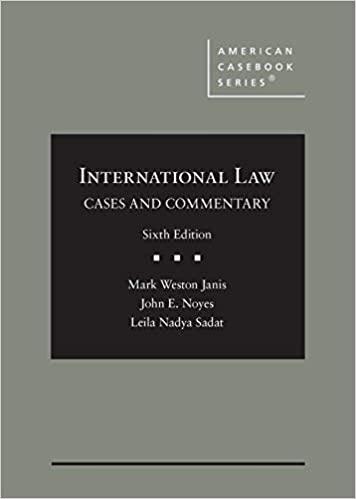Question
Scenario: Ethics and Legal Malpractice Failing to perform legal work, neglecting cases, and failing to communicate with clients make up a large number of the
Scenario:
Ethics and Legal Malpractice
Failing to perform legal work, neglecting cases, and failing to communicate with clients make up a large number of the ethical complaints filed against attorneys. Clients, understandably, do not have a lot of patience if their lawyer misses a deadline. Unfortunately, mistakes do happen even with computerized case management systems.
One recent lawsuit involved a mistake made by a paralegal, who apparently misread a court rule and entered a wrong filing deadline into the firm's calendar with the result being that the law firm did not file an important notice of appeal for a client on time.
On Westlaw, pull up a copy ofPincay v. Andrews, 389 F.3d 853 (9th Cir. 2004) to find out what happened. Then answer the following questions:
- What ethical rules did the court discuss?
- What was the court's holding?
- What law firm made the mistake?
- What can the law firm do to prevent themselves from making the same mistakes in the future?
Response submitted:
What ethical rules did the court discuss?
Andrews's notice of appeal was due 30 days later, but a paralegal charged with calendaring filing deadlines misread the rule and advised Andrews's attorney that the notice was not due for 60 days, the time allowed when the government is a party to the case. See Fed. R.App. P. 4(a)(1)(B). Andrews's counsel learned about the error when Pincay relied upon the judgment as being final in related bankruptcy proceedings, and Andrews promptly tendered a notice of appeal together with a request for an extension within the 30-day grace period. By that time the matter had been in litigation for more than 15 years. Everyone involved should have been well aware that the government was not a party to the case, and any lawyer or paralegal should have been able to read the rule correctly.
What was the court's holding?
The mistake itself, the paralegal's misreading of Federal Rule of Appellate Procedure 4(a)(1)(A), was egregious and the lawyer undoubtedly should have checked the Rule itself, noting, a lawyer's failure to read an applicable rule is one of the least compelling excuses that can be offered, the district court viewed the situation differently, would have ended the litigation then and there with an irreparably adverse result for Andrews. The district court, however, found the neglect excusable and granted the motion for an extension of time to file the notice of appeal.
What law firm made the mistake?
Both the paralegal and the lawyer were negligent. That, however, represents the beginning of our inquiry as to whether the negligence is excusable, not the end of it. The real question is whether there was enough in the context of this case to bring a determination of excusable neglect within the district court's discretion. A lawyer's failure to read an applicable rule is one of the least compelling excuses that can be offered, yet the nature of the contextual analysis and the balancing of the factors adopted in Pioneer counsel against the creation of any rigid rule.
What can the law firm do to prevent themselves from making the same mistakes in the future?
Lawyers should not rely on Pincay II. The case is wrongly decided. The Ninth Circuit is out of step with all of its sister courts on this issue. None of this means, of course, that lawyers and law firms cannot rely on centralized calendaring and docketing systems that are maintained by non-lawyer staff. Such systems are common and generally are accurate and efficient. But, as the saying goes and as Pincay I and Pincay II demonstrate "garbage in, garbageThe best systems are valueless if the information that is calendared is inaccurate or incorrect. Errors are less likely where a lawyer reads the applicable rule and tells the calendaring clerk the date to record, rather than relying on a nonlawyer staff member to read the rule and correctly calculate due dates. This is because lawyers are less likely than non-lawyers to misread procedural rules.
Professor Questions to answer:
Now, the first question to ask about ethics. The rule that you described in your first response was a procedural rule. That's not really an ethical rule.
Where would we find our rules of ethics? Did the court identify any ethical rules in its opinion?
As you properly explain, the trial court held that the error made by the paralegal wasexcusable.
Therefore, the trial court allowed for the extension of time to respond. What did the appellate court rule, in terms of their evaluation of the trial court decision?
Now, I think you provided some interesting, overall assessments on the decision. Where did you find this information? What have other circuits held on this matter? What tests have they applied?
Step by Step Solution
There are 3 Steps involved in it
Step: 1

Get Instant Access to Expert-Tailored Solutions
See step-by-step solutions with expert insights and AI powered tools for academic success
Step: 2

Step: 3

Ace Your Homework with AI
Get the answers you need in no time with our AI-driven, step-by-step assistance
Get Started


